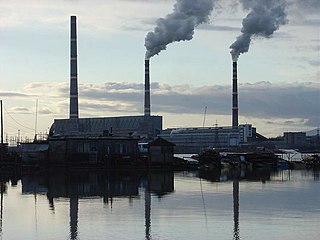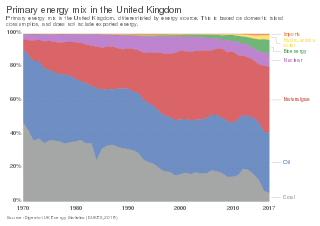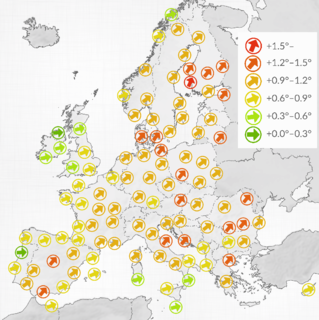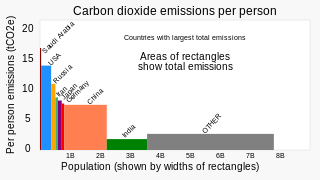Related Research Articles
Emissions trading is a market-based approach to controlling pollution by providing economic incentives for reducing the emissions of pollutants. The concept is also known as cap and trade (CAT) or emissions trading scheme (ETS). Carbon emission trading for CO2 and other greenhouse gases has been introduced in China, the European Union and other countries as a key tool for climate change mitigation. Other schemes include sulfur dioxide and other pollutants.

A carbon tax is a tax levied on the carbon emissions required to produce goods and services. Carbon taxes are intended to make visible the "hidden" social costs of carbon emissions, which are otherwise felt only in indirect ways like more severe weather events. In this way, they are designed to reduce carbon dioxide (CO
2) emissions by increasing prices of the fossil fuels that emit them when burned. This both decreases demand for such goods and services that produce high emissions and incentivizes efforts to make them less carbon-intensive. In its simplest form, a carbon tax covers only CO2 emissions; however, they can also cover other greenhouse gases, such as methane or nitrous oxide, by taxing such emissions based on their CO2-equivalent global warming potential. When a hydrocarbon fuel such as coal, petroleum, or natural gas is burned, most or all of its carbon is converted to CO
2. Greenhouse gas emissions cause climate change, which damages the environment and human health. This negative externality can be reduced by taxing carbon content at any point in the product cycle. Carbon taxes are thus a type of Pigovian tax.
A carbon credit is a generic term for any tradable certificate or permit representing the right to emit one tonne of carbon dioxide or the equivalent amount of a different greenhouse gas (tCO2e).

The Government of Singapore consists of several departments, known as ministries and statutory boards in Singapore. Ministries are led by a member of the cabinet and deal with state matters that require direct political oversight. The member of the cabinet heading the ministry is known as the minister, who is supported by a junior minister known as the minister of state in Singapore. The administrative management of the ministry is led by a senior civil servant known as a permanent secretary.

The current energy policy of the United Kingdom is the responsibility of the Department for Business, Energy and Industrial Strategy (BEIS), after the Department of Energy and Climate Change was merged with the Department for Business, Innovation and Skills in 2016. Energy markets are also regulated by the Office of Gas and Electricity Markets (Ofgem).

A low-carbon economy (LCE) or decarbonised economy is an economy based on energy sources that produce low levels of greenhouse gas (GHG) emissions. GHG emissions due to anthropogenic (human) activity are the dominant cause of observed climate change since the mid-20th century. Continued emission of greenhouse gases may cause long-lasting changes around the world, increasing the likelihood of severe, pervasive, and irreversible effects for people and ecosystems.

Greenhouse gas emissions from human activities strengthen the greenhouse effect, causing climate change. Most is carbon dioxide from burning fossil fuels: coal, oil, and natural gas. The largest polluters include coal in China and large oil and gas companies, many state-owned by OPEC and Russia. Human-caused emissions have increased atmospheric carbon dioxide by about 50% over pre-industrial levels.

The Climate Change Act 2008 is an Act of the Parliament of the United Kingdom. The Act makes it the duty of the Secretary of State to ensure that the net UK carbon account for all six Kyoto greenhouse gases for the year 2050 is at least 100% lower than the 1990 baseline, toward avoiding dangerous climate change. The Act aims to enable the United Kingdom to become a low-carbon economy and gives ministers powers to introduce the measures necessary to achieve a range of greenhouse gas reduction targets. An independent Committee on Climate Change has been created under the Act to provide advice to UK Government on these targets and related policies. In the act Secretary of State refers to the Secretary of State for Energy and Climate Change.
The Climate Change Committee (CCC), originally named the Committee on Climate Change, is an independent non-departmental public body, formed under the Climate Change Act (2008) to advise the United Kingdom and devolved Governments and Parliaments on tackling and preparing for climate change. The Committee provides advice on setting carbon budgets, and reports regularly to the Parliaments and Assemblies on the progress made in reducing greenhouse gas emissions. Notably, in 2019 the CCC recommended the adoption of a target of net zero greenhouse gas emissions by the United Kingdom by 2050. On 27 June 2019 the British Parliament amended the Climate Change Act (2008) to include a commitment to net zero emissions by 2050. The CCC also advises and comments on the UK's progress on Climate change adaptation through updates to Parliament.

Emission trading (ETS) for carbon dioxide (CO2) and other greenhouse gases (GHG) is a form of carbon pricing. It is an approach to limit climate change by creating a market with limited allowances for emissions. This can lower competitiveness of fossil fuels and accelerate investments into low carbon sources of energy such as wind power and photovoltaics. Fossil fuels are the main driver for climate change. They account for 89% of all CO2 emissions and 68% of all GHG emissions.
Greenhouse gas emissions by Australia totalled 533 million tonnes CO2-equivalent based on Greenhouse Gas national inventory report data for 2019; representing per capita CO2e emissions of 21 tons, three times the global average. Coal was responsible for 30% of emissions. National Greenhouse Gas Inventory estimates for the year to March 2021 were 494.2 million tonnes, which is 27.8 million tonnes, or 5.3%, lower than the previous year. It is 20.8% lower than in 2005. According to the government, the result reflects the decrease in transport emissions due to COVID-19 restrictions, reduced fugitive emissions, and reductions in emissions from electricity. There were however increased emissions from the land and agriculture sectors.

Climate change in Canada has had large impacts on the country's environment and landscapes. The number of climate change–related events, such as the 2013 Alberta Floods and an increasing number of forest fires, has become an increasing concern over time. Canada's annual average temperature over land has warmed by 1.7 degrees Celsius since 1948. The rate of warming is even higher in Canada's north, the Prairies, and northern British Columbia. The country's precipitation has increased in recent years and extreme weather events have become more common.

The climate change policy of the United States has major impacts on global climate change and on global climate change mitigation. This is because the United States is the second largest emitter of greenhouse gasses in the world after China, and is among the countries with the highest greenhouse gas emissions per person in the world. In total the United States has emitted over 400 billion metric tons of greenhouse gasses, more than any country in the world.

The Clean Energy Act 2011 was an Act of the Australian Parliament, the main Act in a package of legislation that established an Australian emissions trading scheme (ETS), to be preceded by a three-year period of fixed carbon pricing in Australia designed to reduce carbon dioxide emissions as part of efforts to combat global warming.

Climate change in Europe has resulted in an increase in temperature of 1.9°C (2019) in the EU compared to pre-industrial level. According to international climate experts, global temperature rise should not exceed 2 °C to prevent the most dangerous consequences of climate change, without CO2 emissions cut that could happen before 2050. Emission reduction means development and implementation of new energy technology solutions. Some people consider that the technology revolution has already started in Europe, since the markets for renewable technology have annually grown.
A carbon pricing scheme in Australia was introduced by the Gillard Labor minority government in 2011 as the Clean Energy Act 2011 which came into effect on 1 July 2012. Emissions from companies subject to the scheme dropped 7% upon its introduction. As a result of being in place for such a short time, and because the then Opposition leader Tony Abbott indicated he intended to repeal "the carbon tax", regulated organisations responded rather weakly, with very few investments in emissions reductions being made. The scheme was repealed on 17 July 2014, backdated to 1 July 2014. In its place the Abbott Government set up the Emission Reduction Fund in December 2014. Emissions thereafter resumed their growth evident before the tax.

Coal, lorries and cows vent almost half of Turkey's five hundred million tonnes of annual greenhouse gas emissions—mostly carbon dioxide with some methane—and these are part of the cause of climate change in Turkey. The nation's coal-fired power stations emit the most carbon dioxide, and other significant sources are vehicles running on petrol or diesel. After coal and oil the third most polluting fuel is fossil gas; which is burnt in Turkey's gas-fired power stations, homes and workplaces. Much methane is belched by livestock; cows alone produce half of the greenhouse gas from agriculture in Turkey.

Greenhouse gas emissions by China are the largest of any country in the world both in production and consumption terms, and stem mainly from coal burning in China, including coal-fired power stations, coal mining, and blast furnaces producing iron and steel. When measuring production-based emissions, China emitted over 14 gigatonnes (Gt) CO2eq of greenhouse gases in 2019, 27% of the world total. When measuring in consumption-based terms, which adds emissions associated with imported goods and extracts those associated with exported goods, China accounts for 25% of global emissions.

State of the Netherlands v. Urgenda Foundation was a court case heard by the Supreme Court of the Netherlands in 2019 related to government efforts to curtail carbon dioxide emissions. The case was brought against the Dutch government in 2013, arguing the government, by not meeting a minimum carbon dioxide emission-reduction goal established by scientists to avert harmful climate change, was endangering the human rights of Dutch citizens as set by national and European Union laws.

The European Green Deal is a set of policy initiatives by the European Commission with the overarching aim of making the European Union (EU) climate neutral in 2050. An impact assessed plan will also be presented to increase the EU's greenhouse gas emission reductions target for 2030 to at least 50% and towards 55% compared with 1990 levels. The plan is to review each existing law on its climate merits, and also introduce new legislation on the circular economy, building renovation, biodiversity, farming and innovation.
References
- 1 2 3 "NCCS | Overview". NCCS. Retrieved 21 November 2021.
- ↑ "nccs". Gov.sg. Retrieved 21 November 2021.
- ↑ "Former Defence Chief appointed to Permanent Secretary post at MEWR". Today (retrieved from NLB). Retrieved 21 November 2021.
- ↑ "One body to coordinate Singapore's climate change policies". Today (retrieved from NLB). Retrieved 21 November 2021.
- ↑ "NCCS | Education Materials". NCCS. Retrieved 21 November 2021.
- ↑ "NCCS | Plans & Reports". NCCS. Retrieved 21 November 2021.
- ↑ "Highlights: National Day Rally 2019". CNA. Retrieved 21 November 2021.
- ↑ "NDR 2019: It could cost S$100 billion or more to protect Singapore against rising sea levels, PM Lee says". CNA. Retrieved 21 November 2021.